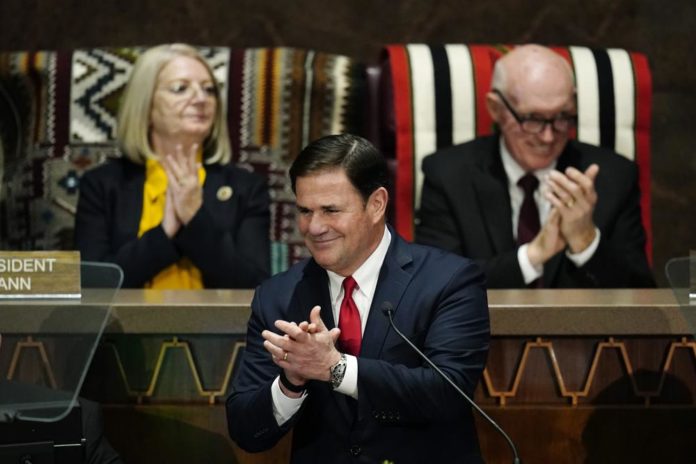
Arizona’s legislature approved a bipartisan $18 billion spending plan early Thursday that will make substantial investments in public schools, build new highways and pay down long-term debts.
Lawmakers in the House and Senate ended a months-long impasse, working through the night to approve the budget shortly before sunrise. Only a handful of dissenters from each party voted against the package of bills, and Republican Gov. Doug Ducey was expected to approve it.
“This is what our state, where voters are nearly evenly divided by party affiliation, has long asked of us — to work together,” said Rep. Reginald Bolding of Laveen, the top Democrat in the House.
The improbable bipartisanship was enabled by an unprecedented surplus topping $5 billion, allowing for a broad array of new spending and savings.
That includes $544 million for border security, roughly half of it for a wall, and $1 billion for highway construction, including widening Interstate 10 north of Casa Grande. State employees will get a raise, many for the first time in a decade. Hundreds of millions are set aside for water infrastructure as the state faces prolonged drought.
The budget also makes a $1.1 billion deposit into the pension fund for public safety and corrections officers, paying off the state’s unfunded liability for future retirement benefits. And it puts another $425 million in the rainy day fund to help the state weather a potential recession.
It also eliminates the state equalization tax, a property tax for education, and backfills it with $330 million from the general fund.
The package of budget bills passed with overwhelming support, highly unusual in the modern era.
Ducey hailed the deal, saying his policies of limited spending and regulation cuts can be credited for the surplus, although massive federal COVID-19 relief money also was a major contributor.
“The result is a booming economy with record revenues,” Ducey said in a statement. “With this budget, we’re putting those dollars to good use and investing in priorities that Republicans and Democrats alike can agree on.”
Republican leaders had struggled for months to craft a spending plan that could find unanimous support in the fractious GOP caucuses without relying on Democrats. Tiny majorities in both chambers meant opposition from a single Republican lawmaker was enough to sink the budget if Democrats were united in opposition.
Ironically, it was the Legislature’s most conservative lawmakers who forced the hands of GOP leaders when they balked at initial, smaller spending proposals. After losing support on the right, House Speaker Rusty Bowers and Senate President Karen Fann had to look elsewhere for votes, and they found them across the aisle.
GOP leaders “decided to just take the easy road out, the path of least resistance, and give up and just spend,” said Sen. Michelle Ugenti-Rita, a Scottsdale Republican who voted against the budget.
“The budget is not sound, and it’s not reflective of my conservative values,” Ugenti-Rita said.
Nobody loves a budget once all the compromises are made, said Senate Majority Leader Rick Gray, R-Sun City.
“Every single budget’s bad,” Gray said. “But for me, it’s encouraging that we have actually come together.”
The plan includes a handful of small, targeted tax cuts for farm machines and private planes but no large-scale reductions. Republicans last year cut $1.7 billion in income taxes.
GOP and Democratic leaders agreed to add $526 million in new ongoing funding for K-12 schools, a substantial increase from the GOP’s initial proposal. Their agreement adds $80 million in combined additional funding for Arizona State University and Northern Arizona University, bringing their funding boosts in line with additional money already allocated to the University of Arizona.
Sen. Sean Bowie, a moderate Phoenix Democrat, joined with moderate Republican Sen. Paul Boyer to push for more school funding, noting that in all, more than $1 billion in new school funding was in the plan, with more than half ongoing. Both are leaving the Legislature after this year.
“Now, this budget isn’t perfect. I had a bill I really cared about that I wanted included in the budget, a tax cut for low-income working families,” Bowie said. “I was told the choice is that bill or more investment in K-12 schools, and I chose our K-12 public schools.”
He cited Boyers’ “leadership, your stubbornness, your perseverance,” for reaching the deal.
Boyer, who started as a Senate staffer and has been a lawmaker for a decade, said this is the first bipartisan budget in at least 15 years.
Lawmakers also agreed to technical changes in a formula for distributing money to schools and $4 million each for school testing and 2022 election costs. A proposed expansion of a tax credit to subsidize private school tuition was removed from the must-pass budget, likely dooming it.
The bipartisanship extended to opposition — a handful of conservative Republicans and liberal Democrats voted against the budget deal.
Sen. Martin Quezada, a Glendale Democrat, spoke out against plans to spend $335 million for a wall on the southern border, which he said would be useless in stopping people from crossing.
“This is really just getting on a soap box and vilifying immigrants and creating a political point,” Quezada said.
But for Democrats, this may have been the last chance for the foreseeable future to make an imprint on the state budget. Republicans are widely expected to expand their majority in the 2022 election thanks to new district boundaries that appear to favor the GOP.
The Legislature plans to return Thursday afternoon to take up legislation directing how the new water cash will be spent and other remaining bills, with an eye to adjourning for the year once those are completed.
Republished with the permission of The Associated Press.













